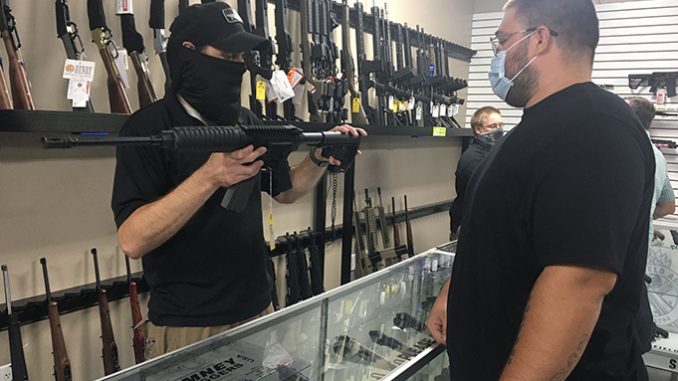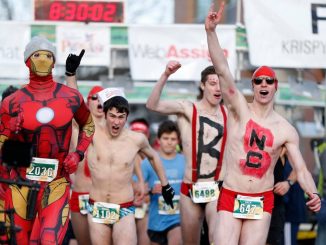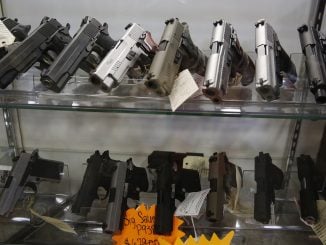
FUQUAY-VARINA — Lee Edmark owned a gun for 25 years but never used it. He gave it away to a friend six months ago.
But in March, economic shutdowns set in, followed by a summer of nationwide protests — sometimes violent — following the death of George Floyd.
The social unrest recently pushed Edmark, who is in his 60s, and his wife, Deb, to purchase a firearm at Fuquay Gun and Gold, in the suburbs just south of Raleigh. They plan to take a firearms course in the near future.
“We were scared,” Edmark said. “You know it when you don’t have a gun.”
Thousands of other North Carolina residents are purchasing firearms for the first time. Fuquay Gun and Gold is currently on pace for a 300% increase in both its sales and customer base, with lines frequently trailing out the door. The buying spree also generated a massive permit processing backup at county sheriff’s offices.
“Some people are trying to protect their businesses in these areas that are getting damaged and torn up,” said store owner Clay Ausley. “In other cases, people are trying to get guns to protect themselves in case some of this comes to their home or hometown.”
In particular, firearms purchases increased drastically among African-Americans and women, followed by an increase among senior citizens, according to Larry Hyatt, owner of Hyatt Guns in Charlotte.
“The African-American leadership [in Charlotte] has been pretty anti-gun,” Hyatt said. “So we have a lot of the urban residents who didn’t have firearms and were depending on police protection. Our African-American communities I think felt more vulnerable.”
Normally June and July are the slowest months of the year — a good time to take a vacation or paint the building, Hyatt said. But this year, June and July were the two biggest months in the entire 61-year history of the business.
Hyatt’s business is normally based on repeat buyers who use firearms for hunting, collecting, and target-shooting. But those sales recently decreased. Now, self-protection is the primary source of business, with self-defense purchases skyrocketing 500%, he said.
“What I hear over and over is, ‘We don’t have a gun in our house, and now I think we need one,’” Hyatt said.
Meanwhile, gun stores are experiencing the biggest supply shortages Hyatt has ever seen. Due to both economic lockdowns and increased sales, factories simply aren’t producing quickly enough. Hyatt Guns currently rations ammunition to one box per customer, despite being one of the largest gun stores in the country.
The shortages also sent prices through the roof. A box of 9-millimeter ammunition at Ausley’s store used to cost $8.99 a box, until his store ran out. The same box now costs between $50 and $60 online.
Scheduling firearms courses is also a challenge. Ausley’s store typically hosts six firearms courses per month, booked around two weeks out. Now, the store is booking 14 classes a month, scheduled all the way through January. At Hyatt’s store, the scheduling backlog partially resulted from the initial months of government lockdown, during which the store was not allowed to offer courses.
Sheriff’s offices overloaded with permit requests
The Wake County Sheriff’s Office received more permit applications in the past nine months than in the entirety of 2018 and 2019 — an unprecedented amount, said Lt. Scott Sefton.
The sheriff’s office even added hours, allowing staff to issue an additional 500 applications per week, noted spokesman Eric Curry.
“We’re definitely not slowing down,” Sefton said. “We’re going as fast as possible.”
But it’s still not enough to keep up, as several applicants have waited months to receive a permit. In early August, Grass Roots North Carolina filed a lawsuit arguing that Wake County Sheriff Gerald Baker is violating a law requiring the office to issue pistol purchase permits within 14 days.
Wake County resident Larry Wright applied for his pistol purchase permit on June 23. It wasn’t approved until Aug. 15. He then tried to schedule an appointment to pick up the permit, but so far, no one has answered the phone.
“I have called the number at least 30 times and there is no answer or a recording that says keep trying,” Wright said in an email. “After 30 days the permit will expire and I will have to go through the process again.”
Wright also applied for a concealed carry permit on July 15, the same day he took his concealed carry course. The first available appointment to take his certificate to Wake County was two months later, on Sept. 15.
As of August 31, the sheriff’s office processed purchase permit applications submitted the week of July 12 and had 5,180 pending applications, the office said in a statement. Appointments for carried concealed applications are booked through December.
In Charlotte, people can purchase self-defense rifles and shotguns by simply completing a government background check, and without going through the sheriff’s office. As a result, Hyatt’s store ran out of self-defense rifles and shotguns, since acquiring those was easier than completing the process for a handgun, Hyatt said.
Current events create “perfect storm” for buying spree
Election years typically increase business by about 50%, Ausley said. This year especially, he says some people fear a move toward increased gun control from Democratic presidential candidate Joe Biden.
But the firearm shortages actually began in 2019. Last year, Virginia Gov. Ralph Northam, a Democrat, promoted several gun-control measures, leading to a surge in firearms purchases from Virginia residents that left a dent in the national firearms supply, Ausley said. This left gun stores headed into the election year with supply levels already lower than usual.
Add onto that the pandemic and protest concerns, and you have “the perfect storm,” Ausley said.
The only comparable surge, Hyatt said, occurred after the 2012 Sandy Hook Elementary School shooting, which resulted in a major push for gun control. But gun supply shortages weren’t as bad that time, because factories were able to keep up with demand.
Purchase and supply shortage issues will probably continue into 2021, Ausley says. That’s partly because the market often takes a year to self-correct, and partly because of politics — if Donald Trump is re-elected, social unrest may intensify, but if Biden wins, he may push for gun control. Either way, the election likely will spur another round of firearms purchases.
“Today may not be the best day to buy a gun when you look at selection and when you look at price,” Ausley said. “But tomorrow could definitely be worse.”



